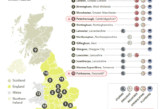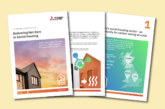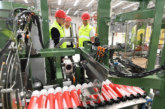Mobilityways published its 48-page Road to Net Zero Study last month, encapsulating findings from a nine-month investigation of large UK organisations’ progress in addressing decarbonisation in their operations and supply chains.
A new comparative study exploring the emissions reduction progress of the UK’s Tier 1 contractors has found that the sector is trailing similarly sized large organisations captured in the Mobilityways Road to Net Zero Study, in terms of both setting and reaching interim goals to reach Net Zero, and in making progress with Scope 1, 2 and 3 carbon emissions reporting.
Just over half (54%) of construction firms, questioned by the employer commute emissions specialist Mobilityways, were collecting Scope 3 emissions numbers by the end of 2023. This compared poorly with both the financial services and the healthcare sector where 71 per cent of 1000+ employee organisations had started Scope 3 emissions reporting. Yet experts say that Scope 3 emissions are, on average, responsible for over 70% of a typical firm’s total Greenhouse Gas (GHG) emissions.
The UK Green Building Council (UKGBC) also recently unveiled its own Net Zero Whole Life Carbon Roadmap update. This report showed that the industry has fallen short on many of its Net Zero emission reduction targets over the last five years. For example, the carbon reduction shortfall which the industry was responsible for in 2022 alone was 11 Metric tonnes of Carbon Dioxide equivalent (MtCo2e). That’s equal to the annual emissions generated by 6.5 million cars or five million UK homes. If it continues on its current trajectory the sector will achieve only a 60% reduction in emissions by 2050.
The UKGBC report found that the construction industry only managed a 4% drop in ‘embodied carbon’ over the 2018 to 2022 period, as against a target of 17% over that same period. Embodied emissions are those linked to the production and transport of building materials, as well as to actual construction, maintenance and finally ‘end of life’ building demolition. This shortfall contributed considerably to the industry reducing overall its emissions by just 13%, as against a total carbon reduction target of 19% over the five year period.
 Julie Furnell, Managing Director of Mobilityways, commented: “One of the problems in the construction sector is that the lines between Scope 1 and 2, often called ‘direct’ emissions, and Scope 3 ‘indirect’ emissions become blurred in the built environment where the key emissions demarcations fall between ‘operational carbon’, focused on the emissions consumed to run a building in terms of energy used for heat, air conditioning and powering buildings in full use; and ‘embodied carbon’ which is much more about building materials and the construction process itself.”
Julie Furnell, Managing Director of Mobilityways, commented: “One of the problems in the construction sector is that the lines between Scope 1 and 2, often called ‘direct’ emissions, and Scope 3 ‘indirect’ emissions become blurred in the built environment where the key emissions demarcations fall between ‘operational carbon’, focused on the emissions consumed to run a building in terms of energy used for heat, air conditioning and powering buildings in full use; and ‘embodied carbon’ which is much more about building materials and the construction process itself.”
The UKGBC confirms the industry’s Scope 3 reporting problem and has recently closed an industry-wide consultation seeking feedback on new guidance setting out proposals for how embodied carbon data can be included within Scope 3 reporting for built environment organisations.
The new guidance aims to establish a coherent link between Scope 3 reporting and embodied carbon assessments, supporting strategic emissions reduction efforts. It also builds on UKGBC’s Guide to Scope 3 Reporting in Commercial Real Estate. The guidance outlines how developers, contractors, owners, occupiers, investors, and facilities managers can include embodied carbon data in their Scope 3 reporting.
It also sets out how architects, engineers, and other professional services organisations can use project-based embodied carbon reporting to show the emissions impact of the projects they are working on. A further aim is to show how embodied carbon assessments can be used over spend-based methods for Scope 3 reporting, improving the overall accuracy of how construction firms capture and report their emissions in accordance with GHG Protocol.
A UKGBC spokesperson confirmed: “Despite being a significant source of carbon emissions in the UK, embodied carbon emissions are currently unregulated, and measurement and mitigation within construction is typically voluntary. As highlighted in our Net Zero Whole Life Carbon Roadmap, the accurate and consistent measurement and reporting of embodied carbon has become increasingly important to ensure meaningful and credible progress towards net zero carbon goals.”
Examining the progress of the 54% of large Tier 1 contractors which have begun Scope 3 emissions data gathering, the Mobilityways study found that here too contractors were behind on specific emissions category levels. For example, only 41% of these companies had ‘worked out a way of measuring GHG emissions from employee commutes to their place of work’.
By contrast, in the UK financial services sector, 54 per cent of companies have worked out a method of capturing employee commute emissions data as part of their Scope 3 emissions reporting. Employee commute is one of 15 categories of ‘indirect’ Scope 3 emissions which need to be collected and reported on. Yet full Scope 3 reporting disclosure is already required for contractors wishing to tender for UK public sector contracts worth over £5m.
Julie Furnell added: “The whole built environment sector is arguably responsible for 45% of total UK emissions, more than any other sector today. It has a great deal to do to reduce operational and embodied carbon. This perhaps explains why the sector compares relatively poorly in terms of capturing emissions for many of its Scope 3 emissions categories which may seem less significant than potential ‘big emission reduction wins’ like mastering modular construction techniques or increasing exposure to the greener retrofitting market.
“Nevertheless, they constitute important sources of carbon. It is now easy to capture the emissions from employees’ commutes. Tools are also on hand to encourage staff to commute greener. All Scope 3 categories need to be explored and reported on to optimise corporate decarbonisation programmes.”
Mobilityways’ full 48-page ‘Road to Net Zero Study’ can now be downloaded here: https://www.mobilityways.com/insights/road-to-net-zero-study.
Net Zero progress findings from construction firms across the UK are here: https://content.mobilityways.com/hubfs/Reports/Road%20to%20Net%20Zero%20Construction%202023.pdf










